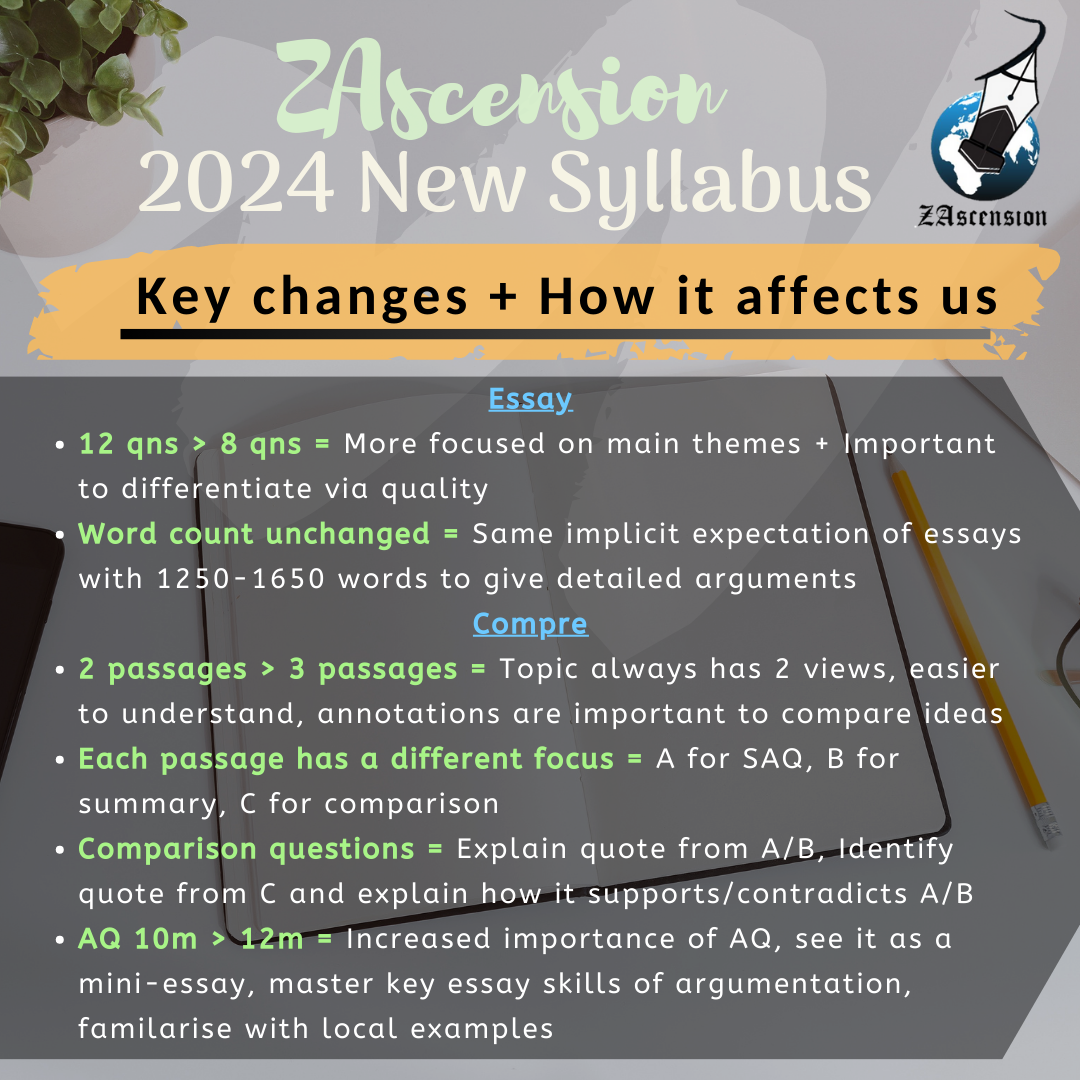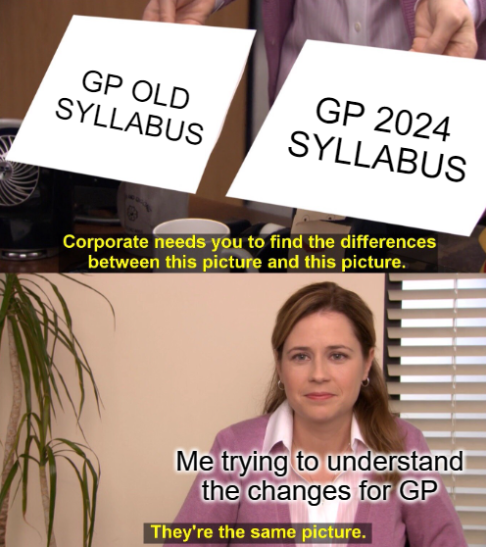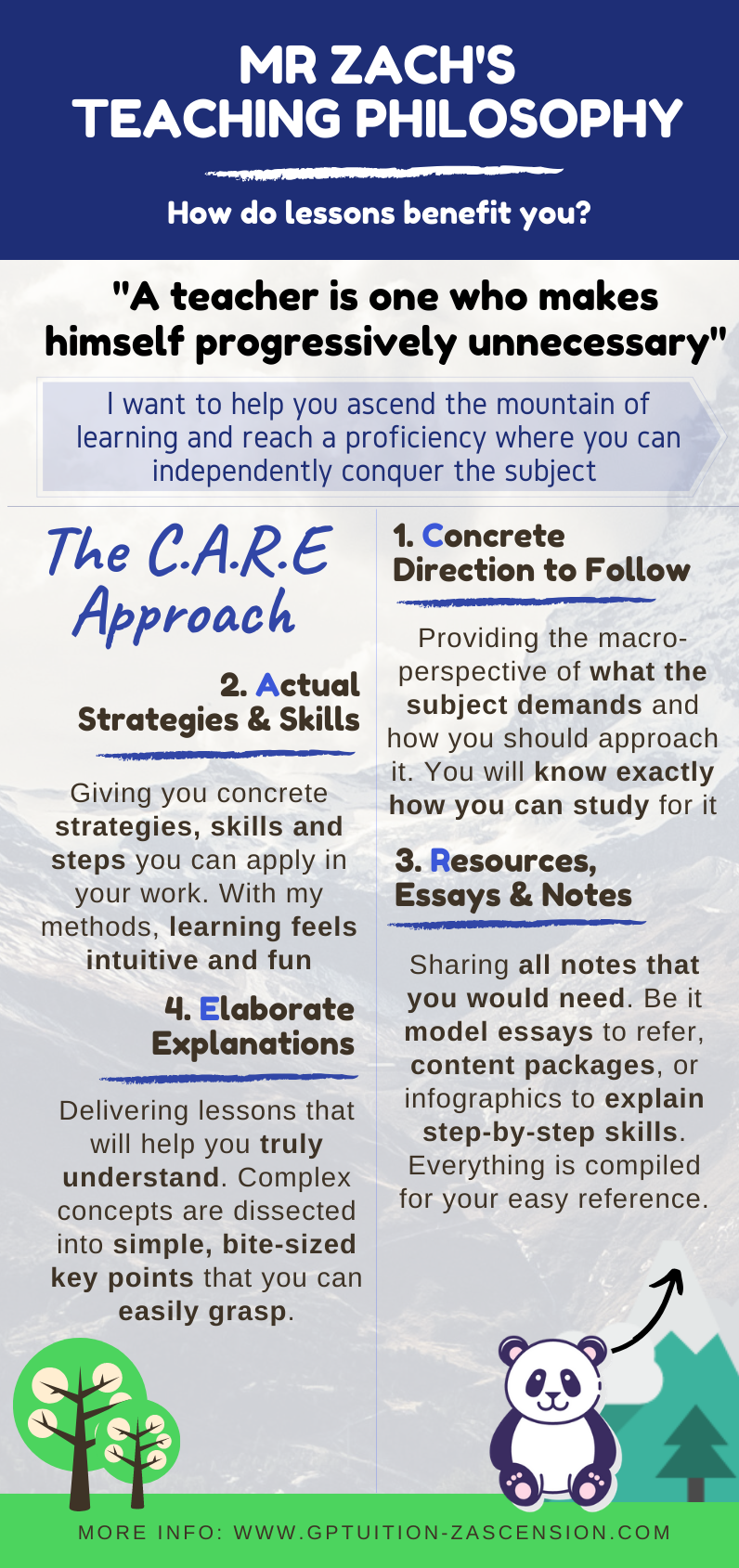Let’s discuss the changes made to Essay and Compre. I want to explain how each of the changes would affect our approach to GP. Of course this is mainly for the J1s of 2023 who will sit for the exam in 2024 (that is when the changes would take place). However, I would also include some key pointers for existing J2 students because the rationale behind these changes would also be seen in 2023 questions (these will be marked in red). For easy reference, I will share the links tot he sample papers over here and also in the respective sections below:
Essay Questions | Compre Passage | Compre Questions
If you want more Tips for GP, do also join this free Telegram channel which would share very helpful Tips, FAQs, and update you when articles are updated/posted 😃
Strategies for 2024 GP New Syllabus (6 Easy Strategies )
1. Essay: 8 instead of 12 questions
Themes: For Essay, the most obvious change is the decrease in selection of questions from 12 to 8. On first glance, this seems to it is now more difficult since we have fewer choices. However, the good news is: questions that are removed belong to insignificant/minor themes that we should not even be studying. For reference on the major themes of GP, click here. Based on the sample paper, the major themes are still kept: Arts, Science & Tech, Politics, Individual & Values, Media, Environment. The ones removed are niche issues like: Poverty, Mathematics, Family, Crime. All along, I have advised students to only focus on major themes to increase the probability of finding a familiar question in the A Levels where we can apply our specialised knowledge.
If we were to examine the new syllabus further—in the listed issues:
- Environment is explicitly listed as one of the key concerns, likely because of recent global trends and discourse around this urgency of the climate crisis
- Politics is singled out as one major area, aligning with the A Level trends where Politics is one of the most major themes because of the number of questions appearing in the exams
- Technology is added to Science to emphasise the differences between these two concepts. Science = Research, Knowledge, Theories | Tech = Application, Inventions, Tools/Machines/Systems
- History and Geography are collapsed into Arts and Humanities – to better reflect how Arts is the major theme, whereas History and Geography are not (they are just niche sub-topics that could be tested, not an entire theme)
- Mathematics has been removed
Differentiation: Fewer questions would also mean that competition becomes more intense because as we know, all A Level subjects do have a bell curve which is designed to account for variation in difficulties of paper across years. Simply put, there is a similar percentage of students who will get A every year because the benchmark of what A looks like changes each year, depending on the quality of the responses. Previously, we could try to select less popular questions so that we can more easily differentiate ourselves (easier to stand out with less competition). Now, given that every question has more student attempting it, it becomes extremely important to find ways to differentiate using the quality of our responses, and not just question choice. There are two three main ways to differentiate: Logic, Vocabulary, Examples/Knowledge.
Logic: In-depth arguments and detailed elaboration on our arguments (note this does not refer to giving facts; instead, it refers to evaluating and explaining those facts and showing how they ATQ)
Vocabulary/Language: Sophisticated language that is appropriately and consistently used + varied and more complex sentence structure
Knowledge: Specific examples (ideally more recent ones) that demonstrate specialised knowledge in that particular issue
TLDR: Focus on the major themes that I have outlined because all the past year trends point to that and the new syllabus confirms the clear focus on major themes. 8 questions, instead of 12, essentially removes the ‘noise’ of other distracting themes that some students (and even schools) wrongly focus on. The content for GP is much clearer now because we can understand themes as chapters, like that of any other H2 subject.
Relevance for current J2s (2023): Continue focusing on the major themes! Given the shift in syllabus and more streamline focus, the major themes that have been popular would be even more prominent in 2023. Remember to also differentiate yourself using logic, language and knowledge.
2. Essay: Word count (Unchanged)
Recommended Essay Length: Word count is still stated as 500-800 words, but as we all know this can essentially be ignored. If we were to actually follow the word count, the essay would very likely fail because elaboration/examples/scope are lacking. I believe this was the intention, but again because of the bell curve and Singapore students being somewhat kiasu to write more, the norm over the years becomes longer essays. Quantity doesn’t = quality but it is definitely a pre-requisite. Length of essay = providing detailed explanation and more examples. A better range would be 1250-1650.
Let us examine a reasonable break down of words in each paragraph for a typical A-grade essay,
- Intro: 150-200
- Each Body Para (x4): 250-325 (total = 1000-1300)
- Conclusion: 100-150
You may also be wondering: do we really need 4 BPs? Can we just do 3? I would say it is difficult to score an A with just 3 BPs because it limits the variety of arguments and perspectives that are discussed. Once again, imagine if you read 2 essays of the same quality and essay X has 1 more BP than Y, would you not be inclined to award X with more marks?
Time Allocation: On that note, this is my suggested time allocation,
- Planning: 15-20m
- Intro + Concl: 10-15m
- Each BP: 15m
If we think about the BP needing 15m, it means we have 15 minutes to write around 280 words, that is roughly 19 words per minute, which is honestly quite manageable! Planning requires substantial time because we have to carefully analyse the question. Question analysis is often the biggest determinant of whether an essay even passes because essays that fail usually fail to answer the question; weaker essays also do not adequately address keywords. Apart from question analysis, it would also be highly recommended to carefully plan the logic of each BP, to know exactly what we want to say before we write. This allows our ideas to be more coherent and ensure that we properly ATQ instead of simply scribbling whatever comes to mind, which often ends up being messy/repetitive.
For more tips on essay writing, check out this article!
Relevance for current J2s (2023): Read the above pointers to get an idea of the recommended word count and time allocation. Everything here applies to you too because word count expectations are the same!
If you want more Tips for GP, do also join this free Telegram channel which would share very helpful Tips, FAQs, and update you when articles are updated/posted 😃
3. Compre: 3 instead of 2 Passages
2 Views and AQ: Previously, some years had single passage while other years had double passages. This is going to be much more standardised moving forward, where there are always 3 passages. The good thing is that there will always be 2 views discussed. At least based on the sample paper, passage A would be view A, B would be opposite view B, and C would be from either view but probably a more personal anecdote. This makes AQ a little easier because there are more diverse viewpoints that we can respond to. Previously, if there was only 1 view, we were forced to engage with that view regardless of whether we like it or not.
Easier Understanding: It is also a little easier to digest the ideas now because there is a clear break to signal what comes next. For example, when I go to passage B, I know that it will be moving on to the negative instead of positive aspects. Before this change, I would have to carefully search for this view transition somewhere within the long passage, assuming a single passage year. If you are worried that there are more words to read, fear not! The total length of the passages is still the same.
Annotations: However, diverse ideas being discussed would also highlight the importance of annotations to keep track of new arguments emerging in the text. I have always emphasised annotating each paragraph to distil its message clearly so that have our own summary of each paragraph’s ideas and can easily refer to that later on when we answer the Short Answer Questions (SAQs). This becomes even more vital now because of comparison questions that force us to thoroughly examine and compare arguments across passages (more on this later, read on to find out more about comparison questions!)
Relevance for current J2s (2023): Given the focus on 2 views, this year’s exam would likely feature double passages. Even if it were going to be single passage, be sure to look out for 2 views within that passage! You would still need to annotate your passage(s) to yield the same benefits of clearly summarising the message of each passage + track how these arguments would progress from one paragraph to the next. It is important to get the big idea to get the following benefits:
- Find the most important keypoints + Will not miss out other paragraphs that also contribute similar ideas
- Infer correctly by understanding the author’s intentions
- Paraphrase correctly to match the author’s intentions
- Properly represent the author’s arguments, especially in AQ
- Find the most important arguments to discuss for AQ, instead of trivial points
All of these happen when we have a very good grasp of arguments discussed by the author, and that starts from the simple step of carefully annotating every paragraph.
4. Compre: Each passage has a different focus
In the old syllabus, there was no distinction, questions could come from any paragraph or passage. It made it harder because when we are reading, we need to focus on everything since we are not sure what will be tested from that section.
Currently, the focus is much clearer (may change in time, but we can deduce these from the sample paper),
- Passage A: 5 SAQs (11 marks)
- Passage B: Summary (8 marks)
- Passage C: Comparison (4 marks)
Passage A and SAQs: Focus on close reading and understanding. This is exactly the same as all past year SAQs. If you are practicing using past year prelims/A Levels papers, you may continue to use those SAQs. Questions can either focus on content (points and arguments raised) or language (literary devices, diction, punctuation). Some questions can be literal (answers found directly but we need to paraphrase keywords instead of directly lifting them), while others can be inferential (answers not found, only clues are given and we need to fill in the gaps to guess the author’s deeper message). There are now fewer of these questions but they still hold the majority of the content marks (11/15), which means that it is still very important to master SAQ techniques pertaining to the different question types I have mentioned above and also in another article.
Additionally, the newest type of question that has emerged in the recent few years is the open-ended language question (how language is used or how logic/language contributes to an effective intro/conclusion). This type of question is more challenging because it requires students to first identify the technique before they can explain how it contributes to the ideas of the passage. Language questions in the past would specify a particular device, which was easier but such questions seem to be less common these days.
Note that passage A would be the longest and the most important since all the main SAQs come from this passage. Be extra meticulous when analysing the paragraphs in this passage.
Passage B and Summary: Focus on getting relevant points (read the summary question beforehand). No change except that the opening words are no longer provided. It just means that we have 4-5 fewer words because that used to be given and excluded from the word count. Honestly, this change does not mean much. The more important positive change is that summary requirements are now clearer because the question is shorter. At least from the sample paper, it seems there is only 1 focus/requirement to summarise whereas questions used to have typically 2. Again, this makes it a bit easier because we have 1 less thing to worry about!
Paraphrasing: Note that the general requirements clearly state that we have to use our own words as far as possible + write in continuous prose. Previously, only certain questions stated that even though there was a clear expectation that we had to paraphrase keywords for every question. Basically, it is much clearer now where we know we must always paraphrase. Take note that paraphrasing does not just mean finding a synonym. We have to ensure that this synonym (or phrase that expresses a similar idea) needs to also match the Connotation + Degree of the original word. Connotation = positive/neutral/negative, Degree = intensity. Words have different connotations and degree, and we must ensure that when we paraphrase we also capture the nuances of the original word! Wrongly paraphrased key ideas would unfortunately yield no marks. This once again reminds us the importance of developing our vocabulary. You may do so via this simple and effective vocab study plan.
Relevance for current J2s (2023): The current syllabus is a bit harder since questions can come from anywhere. What we can do is to first check which paragraphs are involved in summary. Those paragraphs would not have SAQs and for these paragraphs we can simply focus on finding points. For other paragraphs, we need to read more closely to get a solid understanding of the ideas, to prepare for the corresponding SAQs. Paraphrasing tips I have shared above would also nicely relate to the current syllabus!
5. Compre: Comparison questions
Passage C and Comparison: Focus on relating these ideas back of what you read in A/B. This is a completely new type of question that tests our critical thinking. It rewards students that have more macro perspectives where they can fully understand arguments and see how the passages are talking to one another. Imagine that the 3 passages are like 3 individuals having a conversation about the topic. For example, the sample paper is looking at the collection of personal data and thinking about its implications. Sometimes they could be contradicting each other for the same idea; sometimes they could reinforce and elaborate on the same idea. You will see both – 1 question on how C supports/contradicts A, 1 question on how C supports/contradicts B. You are required to IDENTIFY 1 idea from C + JUSTIFY how it supports/contradicts a specific line from A/B.
If you have done social studies or history before, you would be familiar with source-based questions. The same technique of cross-referencing applies. To properly identify an idea from C, we would need to first have a proper understanding of the quoted sentence from A/B. When given a quoted sentence, be sure to highlight key ideas from there. Using the sample passage and questions as an example (topic about collection of personal data).
Use these Strategies:
- Carefully examine and understand the base idea from A/B
- Explain your understanding of this base idea (paraphrase)
- Identify keywords from the base idea and find something in C pertaining to these keywords, either to support/contradict
- Quote this idea in C
- Explain this idea in your own words (do not lift, paraphrased keywords to show understanding)
- Explain how this supports/contradicts | Use vocabulary with positive/negative connotation to clearly show how it support/contradict | Elaborate more for this part to show your logic
In short, Explain idea A/B > Identify idea C > Explain idea C.
- Quote from A: ‘The more information that is collected, the more powerful the “swarm” response can be’. | Keywords = information collected, swarm response, more powerful (benefit). Swarm response = collective group intelligence that comes from crowdsourced data
- Answer: Passage 3’s idea about how ‘we have rights to reclaim our data, but some companies did not even respond’ contradicts passage 1’s idea about data being shared generously for collective societal good. Companies refusing to share data means that they are hoarding it for their own self-serving aims, which results in data collected not being transparently shared to generate insights for the larger society. (Note that positive words here are highlighted in green, whereas negative words are in red to clearly contrast | 1 positive, 3 contradict 1 = negative)
- Quote from B: ‘Once your personal information is out there, there really is no way to stop it from being circulated or used’ | Keywords = personal, out there, no way to stop, circulated/used (harm)
- Answer: Passage 3’s idea about ‘data data derived from other data that had been collected… using statistical models and based on likelihoods’ supports passage 2’s idea about being powerless to restrict how personal information is utilised once it has been shared. Companies freely analyse and divulge our collected data to other third-party companies in order to predict our behaviour and preferences, and we cannot choose how we want our data to be used. (2 negative, 3 support 2 = negative)
Relevance for current J2s (2023): While old syllabus SAQs do not have comparison questions, we can incorporate this into our AQ. We can score extra points when we pick evidence from the passage(s) showing how an argument has been supported/contradicted by another part of the passage, to demonstrate that we have a thorough understanding of the entire text. We can proceed to evaluate this and compare it to the Singapore context.
6. Compre: Application question (AQ)
Increased Importance: AQ now has 12 marks instead of 10. This would better align it to the time required. Last time, SAQ had 17 marks while AQ had 10 marks, but both sections actually needed a similar amount of time because of how AQ is essentially a mini essay with at least 2 BPs required. Now, SAQ = 15, AQ = 12. This would better reflect the substantial amount of time needed to complete AQ. In other words, the time saved from having to answer another SAQ of 2 marks, give us 3-4 extra minutes for AQ (enough to do a fairly detailed plan). Many students often do not plan AQ because of time constraints. Yet, planning is crucial. Just like essay planning, AQ planning ensures that we have a coherent logic and carefully chosen local examples that relate to ideas discussed in the passage. Of course, more time would again mean more competition because every student would likely deliver a slightly higher quality AQ. Just like essay, you may differentiate your AQ via Logic, Language, Knowledge.
Logic: How well do you understand the passage? Are you able to show insightful evaluation? Does your idea about Singapore properly address the argument you have selected? Is the selected argument even a major point or just something trivial that is not the author’s focus?
Language: Do you use evaluative language? Again, are there sophisticated vocabulary and sentence structures that are used appropriately and consistently?
Knowledge: Do you provide specific examples from the local context or merely highlight general observations that do not show an in-depth understanding of the local context?
AQ being a mini-essay and now having more marks mean that we get even more benefits in mastering essay skills. Whatever skills we learn from crafting persuasive arguments and explaining examples would also apply nicely to AQ!
Relevance for current J2s (2023): Cambridge’s focus on AQ likely means that this is a big component of the paper that differentiates students who score better in Compre. Perhaps many students score a similar mark for SAQ but the range disparity is a lot wider for AQ. In short, pay attention to AQ skills and incorporate what you have learned for Essay.
_____________________________________________________________________________________________________________________
If you found this useful, check out our new GP Tips & Resources Telegram Channel! Click here to join. This channel is meant to act as a GP companion to share knowledge and help all students, regardless of whether they are a part of ZAscension.
Everyday there will be Tips of the Day, Answers to FAQs, Articles and many more. So if you enjoyed this article, this channel will definitely be useful for you 😃 I am very passionate about sharing knowledge, let’s help to build this community to enhance the pool of collective knowledge!
We are happy you stopped by ZAscension! If you need extra help that is more comprehensive and more personalised, don’t be afraid to seek it, we are more than happy to guide you in this journey.




